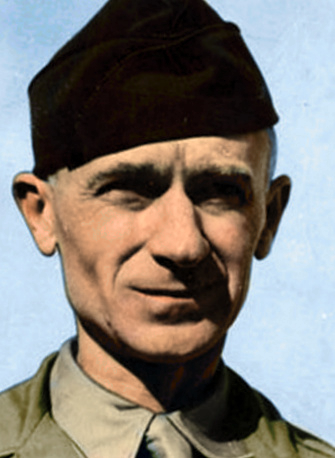The Pittsburgh Press (September 2, 1944)

Roving Reporter
By Ernie Pyle
In France – (by wireless)
We left Paris after a few days and went again with the armies in the field. In Paris we had slept in beds and walked on carpeted floors for the first time in three months.
It was a beautiful experience, and yet for some perverse reason a great inner feeling of calm and relief came over us when we once again set up our cots in a tent, with apple trees for our draperies and only the green grass for a rug.
Hank Gorrell of the United Press was with me, and he said, “This is ironic, that we should have to go back with the armies to get some peace.”
The gaiety and charm and big-cityness of Paris somehow had got a little on our nerves after so much of the opposite. I guess it indicate that all of us will have to make our return to normal life gradually and in small doses.
Paris prices inflated
Paris unquestionably is a lovely city. It seems to me to have been but little hurt by the war. You can still buy almost anything imaginable if you have money. Everybody is well-dressed. But prices are terrific, and already they have started zooming higher.
Those of us who expect to be coming home before long have made shopping tours and stocked up with gifts. And with the exception of perfume, which is dirt cheap, we pay about three times what we would at home for the same thing.
I’m sorry the restaurants could not open before we left. For although I’m not much of a gourmet I do value the sense of taste, and we’ve eaten enough meals in private homes and small-town restaurants over here to realize that it’s all true about the French culinary genius.
They simply have a knack for making any old thing taste wonderful, just as the British have a knack for making everything taste horrible.
The other night we were talking about the beautiful women of Paris – as who doesn’t?
One fellow said the women here were the most beautiful in the world.
They have that knowhow
But I said no, that wasn’t true. You see women in America and England who are just as beautiful as any in Paris. But it seems that here the percentage of good-looking women is higher than in other countries.
And another fellow said no, that wasn’t it either. He thought the ratio was approximately the same in America and England and France. But in Paris a bigger percentage have the gift of getting themselves up to look devastating.
And I guess that’s it.
We thought there were a lot of people on the streets those first two days. But you should have seen Paris a few days later, when the whole populace began to come out. By midafternoon it is almost impossible to drive in the streets because of the bicycles. They take up the entire street, as far as you can see. The sidewalks are packed. It’s like Christmas shopping tithe at home.
Within three days, Paris was transformed from a city crackling and roaring with brief warfare into a city entirely at peace. With in three days Paris was open for business as usual, and its attitude toward the war reminded me of Cairo after it threat of danger had gone.
As usual, those Americans most deserving of seeing Paris will be the last ones to see it, if they ever do. By that 1 mean the fighting soldiers.
Rear echelons get the kisses
Only one infantry regiment and one reconnaissance outfit of Americans actually came into Paris, and they passed on through the city quickly and went on with their war.
The first ones in the city to stay were such nonfighters as the psychological-warfare and Civil Affairs people, public-relations men and correspondents.
I heard more than one rear-echelon soldier say he felt a little ashamed to be getting all the grateful cheers and kisses for the liberation of Paris when the guys who broke the German Army and opened the way for Paris to be free were still out there fighting without benefit of kisses or applause.
But that’s the way things are in this world.


